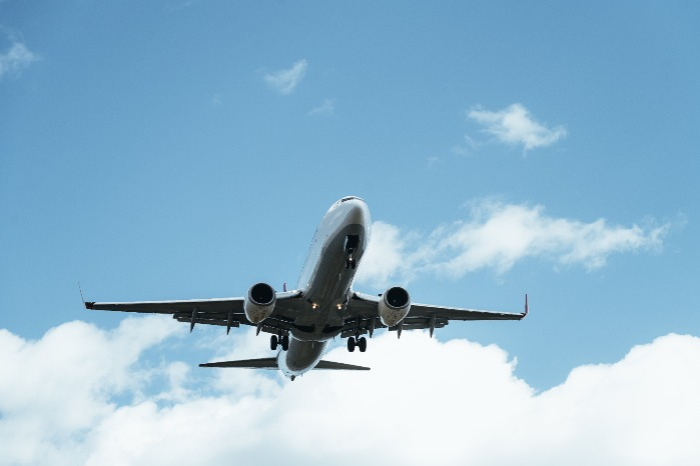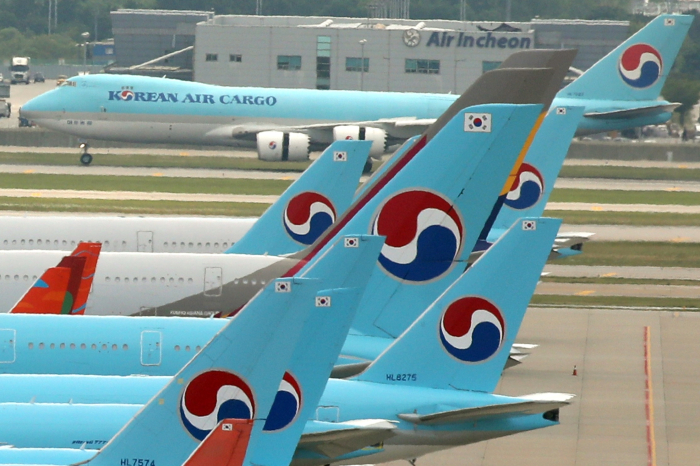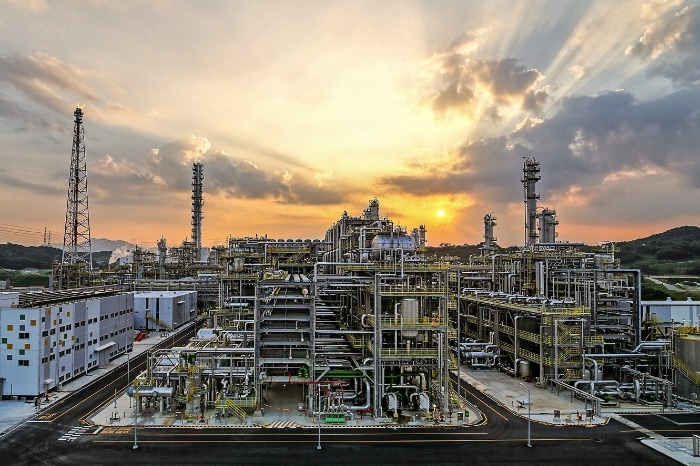S.Korea to launch sustainable biojet fuel initiative
Domestic oil refiners are asking the government to subsidize their alternative jet fuel production
By Aug 20, 2024 (Gmt+09:00)
Samsung steps up AR race with advanced microdisplay for smart glasses


When in S. Korea, it’s a ritual: Foreigners make stops at CU, GS25, 7-Eleven


Maybe Happy Ending: A robot love story that rewrote Broadway playbook


NPS yet to schedule external manager selection; PE firms’ fundraising woes deepen


US auto parts tariffs take effect; Korea avoids heavy hit



South Korea will require airlines to replace a portion of their jet fuel with environmentally friendly alternatives such as cooking oil, palm oil and biodiesel from as early as 2025 in line with the global policy shift to sustainable aviation fuel (SAF), according to oil refinery and aviation industry sources.
The government is expected to announce the initiative on August 30, following in the footsteps of the European Union, which in 2023 passed a law stipulating that 2% of jet fuel must be sustainable as of 2025 and 70% by 2050.
SAFs emit about 80% less carbon than conventional jet fuel, but cost about two to five more than fossil fuel such as kerosene. So the shift to SAF would lead to an increase in airline ticket prices, with fuel accounting for about 30% of the cost of one flight.
The eco-friendly initiative for the aviation industry is also expected to threaten South Korea's No. 1 position in the aviation fuel export market. Domestic oil refineries process crude oil imported from the Middle East into jet fuel at competitive prices. But they have no SAF production facilities yet.

Korean Air Lines Co., South Korea’s full-service air carrier, has begun to use a mix of SAF and fossil fuel for the Incheon-Paris route since 2022.
Starting on August 30, the flag carrier will fleet its aircraft with the blended fuel for the Incheon-Tokyo route and expand it to other routes in phases. Incheon International Airport is South Korea's main air gateway.
To promote the adoption of SAF, the government plans to provide subsidies to oil refineries that install SAF refueling facilities at domestic airports and relax the relevant regulations, as the US, Japan, Germany and the Netherlands do.
Also, South Korea may consider cutting taxes on SAF-related facilities. Constructing an SAF facility that has a capacity of processing 500,000 tons of fuel costs about 1 trillion won ($752 million).

In 2022, South Korea exported 14.8 trillion won worth of jet fuel, outstripping the 10.3 trillion won from its mobile phone shipments the same year.
But the country is far behind other countries such as the US and China in the SAF segment. In the world, there are 323 SAF production facilities, but none of them are South Korean.
According to the International Air Transport Association, global SAF demand is forecast to surpass 400 billion tons in 2050, matching current jet fuel demand of 350 billion-400 billion tons. That means all airplanes will fly with SAF by then.
The US, the world’s largest aviation fuel importer, plans to replace 100% of jet fuel with SAF by 2050.
In tandem with such a trend, SK Energy Co. will modify its crude oil processing facility for commercial production of SAFs. Other domestic oil refiners such as S-Oil Corp., HD Hyundai Oilbank and GS Caltex Corp. are considering building SAF-dedicated facilities.
They are asking the government to provide subsidies and tax credits for the construction of SAF plants that would cost billions of dollars.
Write to Sang Hoon Sung and Woo-Sub Kim at uphoon@hankyung.com
Yeonhee Kim edited this article.
-
 EarningsKorea’s airline firms plagued by elevated fuel costs, strong dollar
EarningsKorea’s airline firms plagued by elevated fuel costs, strong dollarAug 16, 2024 (Gmt+09:00)
2 Min read -
 PetrochemicalsHD Hyundai Oilbank exports bio marine fuel blends
PetrochemicalsHD Hyundai Oilbank exports bio marine fuel blendsJul 30, 2024 (Gmt+09:00)
1 Min read -
 AirlinesKorean Air expects US approval for Asiana merger by end-Oct: report
AirlinesKorean Air expects US approval for Asiana merger by end-Oct: reportJun 03, 2024 (Gmt+09:00)
1 Min read -
 Mergers & AcquisitionsAsiana Airlines to sell cargo business for merger with Korean Air
Mergers & AcquisitionsAsiana Airlines to sell cargo business for merger with Korean AirNov 02, 2023 (Gmt+09:00)
3 Min read -
 Carbon neutralitySK to invest in S.Korean company for bio jet fuel materials
Carbon neutralitySK to invest in S.Korean company for bio jet fuel materialsOct 17, 2023 (Gmt+09:00)
2 Min read -
 PetrochemicalsLG Chem, Eni eye JV to build biofuel plant in Korea
PetrochemicalsLG Chem, Eni eye JV to build biofuel plant in KoreaSep 14, 2023 (Gmt+09:00)
2 Min read -
 AirlinesKorean Air to use bio-jet fuel on international flights
AirlinesKorean Air to use bio-jet fuel on international flightsJun 29, 2023 (Gmt+09:00)
2 Min read -
 AirlinesAsiana to introduce sustainable aviation fuel in partnership with Shell
AirlinesAsiana to introduce sustainable aviation fuel in partnership with ShellJan 30, 2023 (Gmt+09:00)
1 Min read


